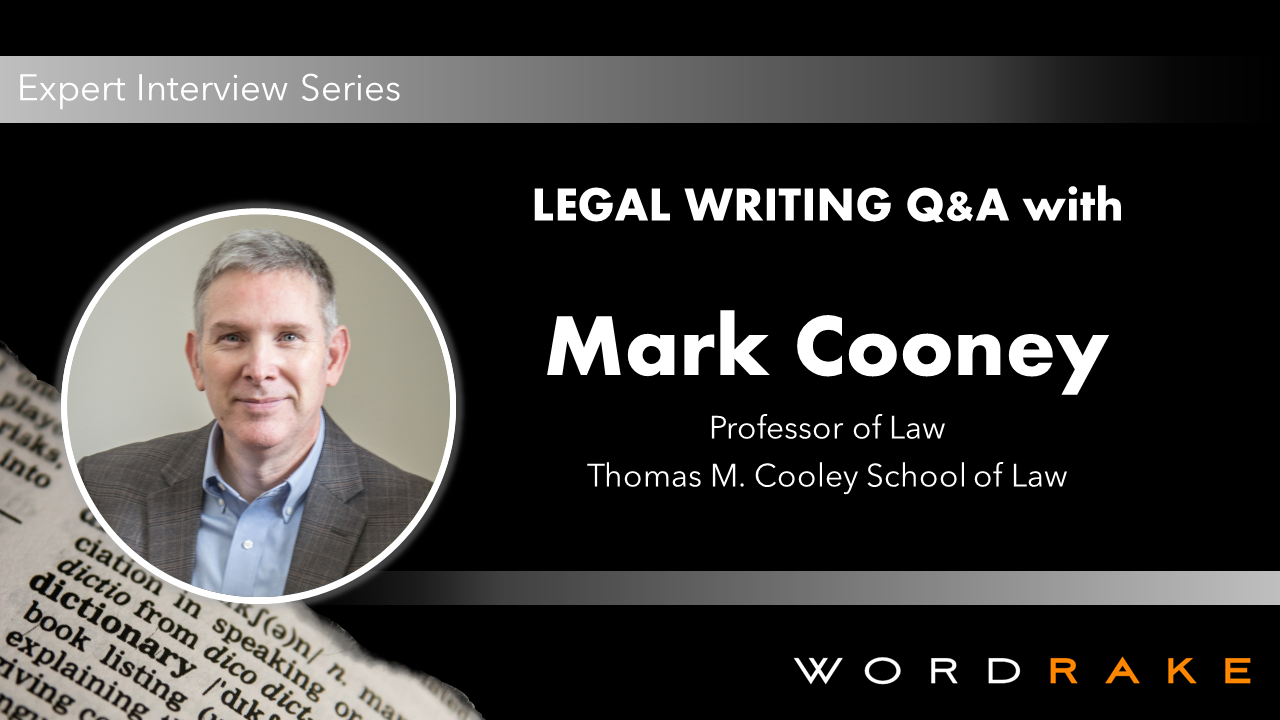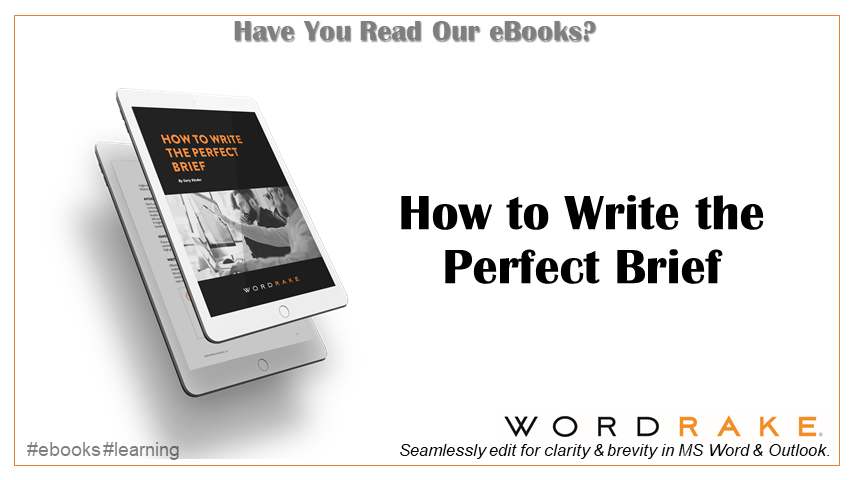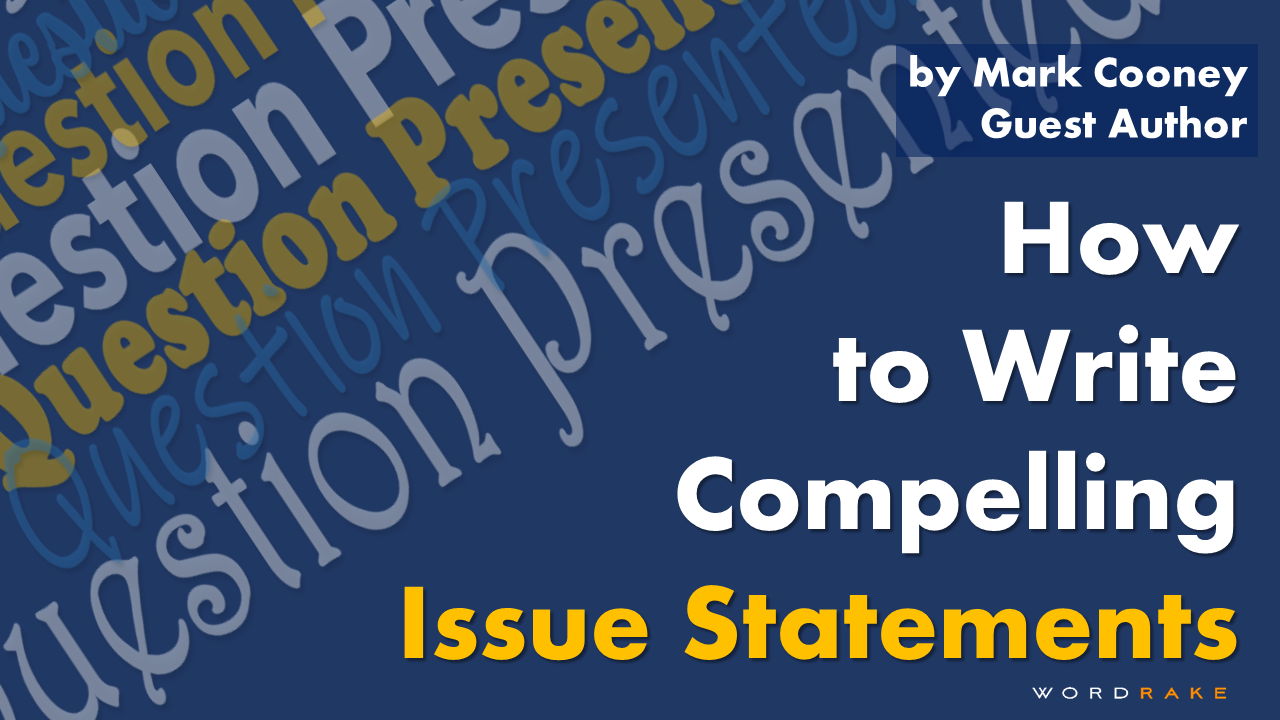What's scarier to an experienced lawyer, a wall of indecipherable legal jargon and Latin-derived gobbledygook, or a brief written in clear, plain language? While the average layperson may be more afraid of the unreadable block of text, Professor Mark Cooney has learned that a succinct, clearly worded document is much more threatening.
What is your role and how did you get to where you are today?
I’m a civil litigator turned writing professor. In my practice years, I had an unusual fascination with writing, clarity, and persuasion. I wanted every brief to be a breath of fresh air for the clerk or research attorney assigned to read it. That was always the goal, though it’s never easy, and I’m sure that I fell short at times.
Then the great Joseph Kimble needed another writing professor for his program at Thomas M. Cooley Law School, so that’s what I’ve been doing since the early 2000s. I’ve inherited Joe’s desk, literally, as the department chair. So I like to point at my desk during student meetings and announce, “This is the desk—the very desk—on which the Federal Rules of Civil Procedure and Federal Rules of Evidence were restyled.” It’s hallowed wood. I’ve enjoyed carrying on Joe’s work.
Why is good writing important to being a good lawyer?
Let me indulge in a little contrarian melodrama: Good writing isn’t important to being a good lawyer. But good writing is important to being a great lawyer.
That requires some explanation, I realize. Most lawyers are good lawyers. They have expertise and work hard and serve their clients admirably. And they do what most lawyers do with their written work, no more or less. They’re busy, and their writing is in the style that judges, court staff, and clients have come to expect. Transactional lawyers rely on forms and adjust as needed. It’s all in the typical style.
So they’re good lawyers. But they aren’t exceptional legal writers, so they aren’t great lawyers. That may sound a bit harsh, but it’s my view of our profession.
A good legal writer is constantly learning about writing techniques and document design. A good legal writer is always thinking about strategies to connect with busy, intelligent readers. If a lawyer thinks this way, then that lawyer has a chance of being a great lawyer. And I hope that every lawyer wants to be a great lawyer.
Can you elaborate on your reference to the typical style?
I’ll put it like this: when I was litigating cases, I loved it when my opposing counsel wrote “pursuant to” this and “subsequent to” that. It was a relief when I saw a six-page motion that said the exact same thing that the judge’s clerk would have to slog through again in the supporting brief. It was a relief when my opponent used parentheticals to announce that John Smith would “hereinafter” be referred to as “Mr. Smith,” as if a judge or judicial clerk needs that alleged help. A lot of this stuff borders on insulting, frankly.
So whenever I saw the usual noise, catchwords, and tics, I knew that there was nothing special about my opponent’s brief. I’m not saying that it was a poor brief. I just knew that it wasn’t a special brief—that it wasn’t making a unique connection with the judge or court staff. And that made me rest easier. But when my opponent wrote in a plain, direct style, that got me worried.
Lawyers can and should learn to write special briefs and contracts. They should write documents that dare to respect readers and connect with the human mind. Lawyers need to write less like lawyers, which takes some courage and confidence. But lawyers are highly intelligent people and can quickly improve. They can learn to use helpful technology. They can read the literature and usage guides occasionally. There’s never been a better time to be a good legal writer. Clients deserve that effort.
What can good brief-writers start doing to become great ones?
For litigation documents, get moving. Get your message out quickly and succinctly at the brief’s start. Avoid all the baggage that weighs down so many motions and briefs. If our reader doesn’t know what we want and why we’re entitled to it within a minute, then we’ve misfired. We need to change the document.
Don’t overestimate the importance of rote details. For instance, dates and document titles are usually unnecessary and distracting. But many lawyers add them automatically, even when they aren’t arguing a time-sensitive or procedural issue.
Also, pay close attention to typography and document design. Academics and other experts have been calling for better typography—with scientific support—for nearly two decades, but from what I see, the profession is paying no attention. I still see ALL-CAPS headings, ALL-CAPS issue statements, intimidating blocks of unbroken text, and so on.
What is the biggest misconception the general public has about legal writing?
That it has to be inflated, wordy, and dense—inconsiderate, basically—to be enforceable or effective. Frankly, even lawyers convince themselves of that. But studies as far back as the 1980s have debunked the “it has to be this way because it’s legal writing” myth. In the most recent study I’ve seen, professors at MIT and the University of Edinburgh pulled no punches: the dense legalese in traditional legal documents is unnecessary, and even the lawyers who participated in the study liked it less.
So no, enforceability doesn’t require a solid wall of unbroken text that lacks informative headings. Enforceability doesn’t require a 140-word sentence spelling out a general rule, its conditions, and its exceptions—with 80 words between the main subject and its verb. Enforceability doesn’t require rote triplets. It doesn’t require complex series with ambiguous trailing modifiers—modifiers that may or may not modify all the series items. And on and on. So no, general public, it’s not true that legal documents must defy every convention of good writing to be enforceable.
In fact, my research continues to show the opposite. Dense walls of legalese jeopardize enforceability. And courts cite the absence of dense legalese as a reason to enforce disputed provisions. I recently coauthored a book chapter about that and plan to expand on that research this summer.
What do you think of the push to make contracts more visual and less verbose?
Love it! Every document gets shorter as the drafter improves it—gets shorter on the word count, I should say. The document might get physically longer because of a drafter’s user-centered design elements. A document grows a bit from informative headings and eye-friendly “white space.” But those elements dramatically improve navigability.
And document design is moving well past that. Whether it’s question-style headings, bullet lists, or even checklists, we’re seeing genuine artistry from professional document designers. You can see examples on the Kimble Center for Legal Drafting’s website.
What advice would you give to legal professionals who are just starting out in the legal world?
New lawyers have a choice to make. So to all the new lawyers out there, I’d say that you got great instruction from your law-school writing professors. Believe in it. Stay true to it even if you see coworkers—senior supervising attorneys or partners—writing in a bloated style or with poor typography. Stay true to what you learned in law school even though your new boss uses an ALLCAPS heading style that your generation (and every leading writing expert) rightfully discourages.
I don’t want to get you into trouble at work, and new employees want nothing more than to fit in. If your boss insists on a certain style, then you must use it. But once you have more control, please remember the lessons you learned in law school.
And continue to care and learn. Continue to explore new writing resources and technologies. Practice doesn’t make perfect. Many lawyers have been writing for decades yet don’t improve or write as effectively as they might. Only lawyers who continue to care, learn, and explore will improve with practice.
About Mark Cooney
Mark Cooney has taught legal-writing courses for more than 20 years and has chaired Cooley Law School’s Research & Writing Department since 2011. Before joining the faculty, he spent a decade in private practice with civil-litigation firms, defending legal-malpractice, medical-malpractice, and product-liability cases. He successfully briefed and argued cases in the U.S. Court of Appeals, the Michigan Supreme Court, and the Michigan Court of Appeals. He chaired the State Bar of Michigan’s Appellate Practice Section and was a co-recipient of the Distinguished Brief Award, which recognizes the most scholarly briefs submitted to the Michigan Supreme Court.
Professor Cooney’s research and professional activities reflect his passion for clear, effective legal writing. He was Editor in Chief of The Scribes Journal of Legal Writing for six volumes and continues to serve as a Senior Editor. In 2018, he shared the Center for Plain Language’s ClearMark Award (Legal Documents category) with Professor Joseph Kimble, his mentor and colleague. In 2017, the Legal Writing Institute, the Association of Legal Writing Directors, and LexisNexis awarded him a grant for empirical research on appellate courts’ use of legal authority.
Professor Cooney’s published works include two books and more than fifty articles. His articles have been cited and quoted in federal and state court opinions and in secondary sources, and his writing tips have appeared in the State Bar’s daily calendar and in the Scribes Tuesday Tip series.
Professor Cooney has presented nationally and internationally at events sponsored by the Association of Legal Writing Directors, Clarity International, the Global Legal Skills Institute, the Institute for Continuing Legal Education, the Legal Writing Institute, the Michigan Appellate Assigned Counsel System, the Michigan Appellate Bench-Bar Foundation, Michigan Defense Trial Counsel, the State Bar’s Appellate Practice and Young Lawyers Sections, and others.
About the Legal Writing Interview Series
WordRake founder Gary Kinder created the software to help legal writers edit for brevity and simplicity. In continued dedication to the most effective legal writing, this Series highlights the experience and advice of experts from professors to writing coaches to litigators. Looking to help boost your legal writing skills? Get a free 1-week trial of WordRake here.








